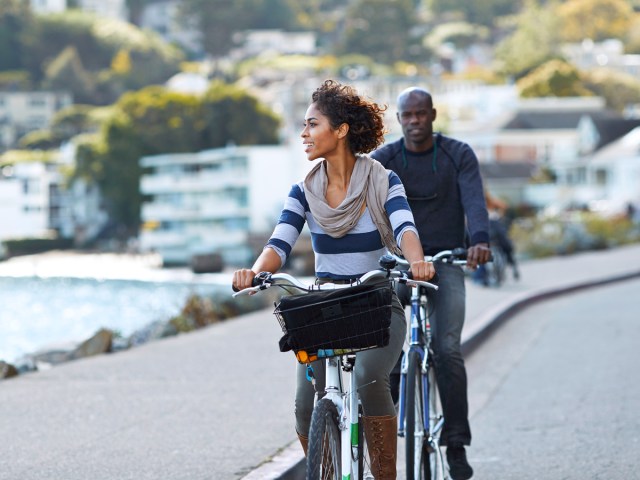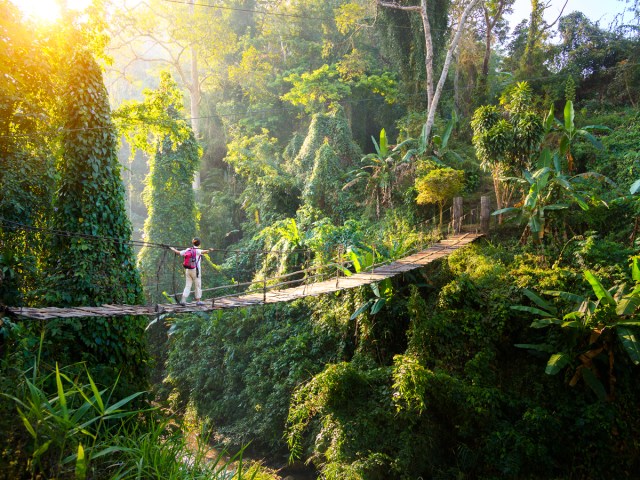Many travelers are eager to check off as many bucket-list attractions as possible on their vacations. It’s easy to understand the motivation, especially if you don’t travel often, have limited vacation days to use, or are jetting off to a faraway destination. But there are some pros to taking your time instead. The increasingly popular practice of “slow travel” encourages you to savor every minute of the journey, making sure you’re present in every place. Here’s how slow travel is changing the way many of us travel — and how to adopt the practice on your next trip.
What Is Slow Travel?

The “slow travel” movement started with food, emphasizing fresh, local, and simple ingredients that emphasize the connection of a cuisine to its culture. Back in 1989, Italian food editor Carlo Petrini founded the grassroots organization Slow Food International to prevent the disappearance of culinary traditions and food cultures around the world. According to Petrini, the world’s desire to move at a quicker pace through advancements of technology has led to a warped carpe diem mentality that often leads to a needlessly rushed, busier schedule.
The “slow” approach places importance on taking time to smell the roses. From food to fashion, slow culture is a “revolution against the notion that faster is always better,” according to Carl Honoré, author of In Praise of Slowness. “It’s about seeking to do everything at the right speed. Savoring the hours and minutes rather than just counting them. Doing everything as well as possible, instead of as fast as possible,” he said.
How does that relate to travel? Slow travel means connecting mindfully, respectfully, and responsibly with the environment and the people you encounter on your journey. It’s about making memories instead of barreling through bucket lists. It is, ultimately, about genuine discovery.
How To Slow Down

Slow travel doesn’t mean you shouldn’t book direct flights if you fly — though long layovers can be a great way to explore — or that you need a month in a destination to “authentically” experience it. But there are some ways to integrate “slow travel” into your life, even when you’re not on vacation.
Exotic places always have their allure, but some amazing discoveries may be right in your own backyard. Don’t stress over an expensive foreign itinerary until you’ve explored the area you call home. Do you know its history? Its architecture? The varying cultures of your neighbors? This, too, is travel, and will enrich your life, minus a suitcase or passport.
Not sure where to start? Call your local library, historical society, or visitors bureau. After you’ve soaked in your own city, venture further afield to the attractions around you. Weekend or even day trips can provide an authentic escape and a deeper connection to your daily surroundings.
Skip Planes and Try Trains, Automobiles, or Boats

Sometimes, you just have to fly. But if you can, consider slower options that give you a chance to connect with the local landscape and the people who live there. Rent a car (or motorbike) and take advantage of serendipitous stops. And though a bullet train or quick flight is speedy, a regional train, bus, or ferry gives you a chance to look out the window, talk to your fellow passengers, and sometimes hop on and off to explore. While getting from point A to point B may be the goal, the experience along the way is also part of the journey — and the essence of slow travel.
Live Like a Local

Instant fluency in a new language is not going to happen overnight, but every traveler is capable of learning a few phrases and putting in a bit of research before jaunting off. Find out about a destination’s unique culture ahead of time by reading a novel, watching a film, or simply browsing the internet for local recommendations. Upon arrival, a visit to a neighborhood market can be delightful and, in some cases, as helpful as information kiosks at a major tourist attraction.
Regardless of location, five-star resorts and high-end restaurants tend to be more alike than they are different. Instead of seeking out the most Instagrammable spots bragged about by high-profile influencers, research comfortable yet modest accommodations and restaurants that local residents can actually afford. Both your wallet and your experience will be much richer — and you’ll be able to take the next journey sooner.
Consider Your Impact

We’ll never scold a fellow traveler for chasing their dreams. But carefully consider how mass tourism can degrade the very destinations we love, in terms of pollution, poverty, and loss of affordable housing options for locals who often have no other choice. Research low-impact ways to connect with your surroundings in a respectful and sustainable way.
Even if you’re traveling in an extremely affluent region, there are always good causes which need support. Ask a local schoolteacher how you can help, stop in at a community center or an animal shelter, or consider making a donation to a local cause or charity. But just as importantly, listen to locals and learn about what will best have a lasting impact on the community.
More from our network
Daily Passport is part of Inbox Studio, an email-first media company. *Indicates a third-party property.
















